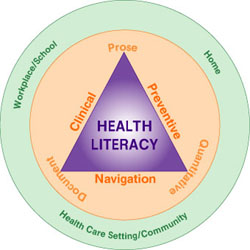Health Illiteracy

Health Illiteracy means insufficient education to understand matters of health; or simply lack of health education.
A person may be able to read and write and count numbers but does he understand and makes effort to keep in mind all that goes during a medical consultation. If he/she has not understood the advice of the physician and/or the pharmacist, we are all in for the big trouble.
Even in the U.S the cost of health care for some of the more health illiterate patients is almost 50 percent higher than necessary.
An estimated 75 billion U.S Dollars could be saved each year by improving health literacy. That means at the moment health illiteracy is costing the American health about 75 billion U.S Dollars every year.
Unnecessary hospitalizations, delays in treatment and problems with prescriptions are among the costly problems that crop up when people do not understand their care and doctors fail to reach out to their patients, a research has showed. Average health care costs for health illiterate Medicaid patients are 47 percent higher than those for all other patients. Costs for Medicare patients are 12 percent higher, and those with private insurance and poor literacy skills pay almost 10 percent more than other patients.
There are about 80 million health-illiterate Americans whose problem go beyond reading a prescription bottle or understanding a doctor’s orders.
Even the most educated patients can find themselves confused by the complicated information that goes along with modern medicine. Inadequate functional health literacy places even a greater barrier to educating patients with chronic diseases.
Chronic diseases, such as diabetes and hypertension require that patients receive education in order to achieve control of their behavior and lifestyle; education may help them avoid, or address, adverse health outcomes. For example, patients with diabetes need to understand how to modify their lifestyles (e.g., diabetic diet, monitor their glucose levels at home) and improve their self-management skills. Patient education also plays a major role in facilitating patients’ acceptance of their diagnosis and active participation in treatment.
If programs in disease management and patient education are to be successful, health providers who are involved in patient education must consider the possibility that patients may have inadequate literacy.
Dr. Ajay Sati.